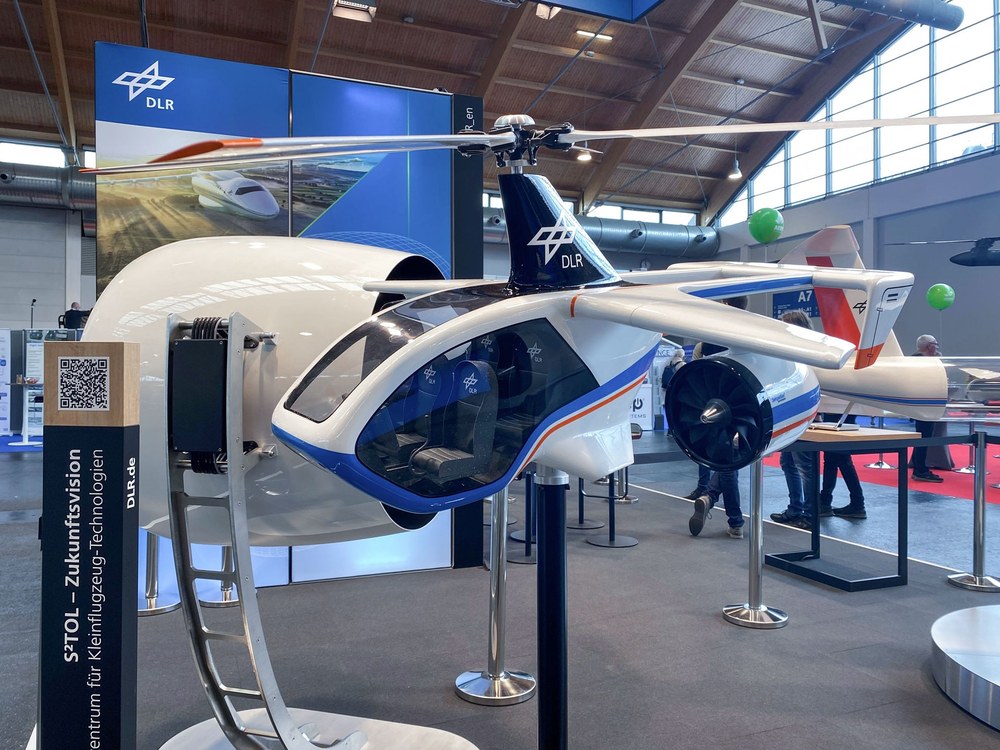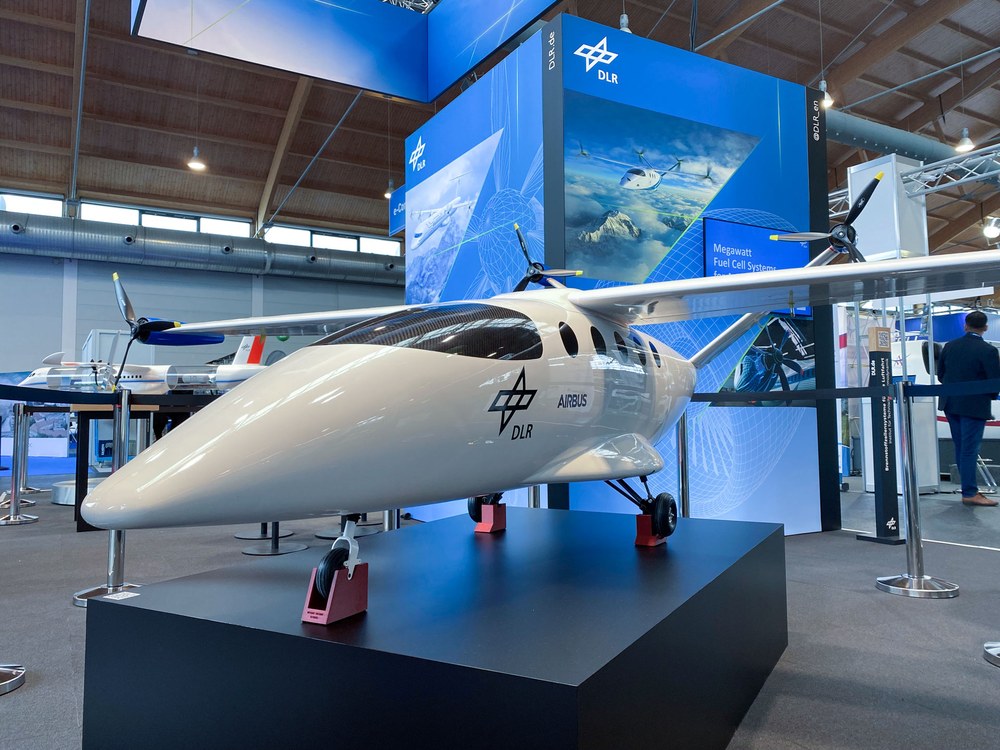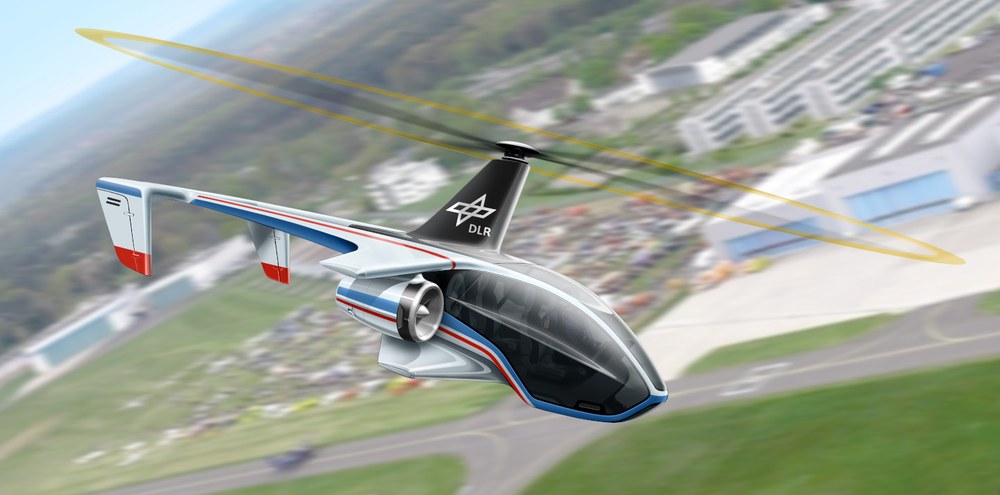Everything electric with DLR at AERO 2023


- DLR once again has an exhibition stand at the AERO general aviation trade fair in Friedrichshafen.
- The focus is on concepts and models for climate-friendly small and regional aircraft.
- General aviation has a special role to play as a pioneer in the introduction of climate-friendly aviation technologies.
- Focus: Aeronautics, climate-compatible flight
AERO in Friedrichshafen is the leading international trade fair for general aviation, business aviation and sport flying. The German Aerospace Center (Deutsches Zentrum für Luft- und Raumfahrt; DLR) will be there in 2023 (in Hall A7, Stand 203) with a focus on climate-friendly flight. From a battery-electric gyrocopter for urban air traffic, to a hybrid-electric short-haul aircraft with approximately 10 passengers, to an electric 50-seater with hydrogen fuel cell propulsion for regional air transport, DLR will be presenting concepts and models of how the sustainable flying of tomorrow can take shape. Two newly founded DLR facilities – the Cottbus Institute of Electrified Aero Engines and the Aachen Innovation Centre for Small Aircraft Technologies – will also be represented.
"DLR is pleased to once again have a stand at AERO in Friedrichshafen," says Markus Fischer, DLR Divisional Board Member for Aeronautics. "General aviation has a special role to play on the path to climate-friendly flight. On shorter routes with few passengers, it is comparatively easy to introduce and test sustainable propulsion systems and concepts, so that they can then be applied more widely for the air transport of the future. That is why we at DLR are increasingly involved in the research, development and testing of climate-friendly small and regional aircraft."
The research commitment follows DLR's aviation strategy 'Towards Zero-emission Aviation'. Electric propulsion systems using hydrogen or batteries as energy sources will play an important role, particularly for small and regional aircraft. DLR's presence at AERO 2023 will focus in particular on the following exhibits and topics.
S²TOL – quiet take-off and landing for urban mobility

Gyrocopters are manoeuvrable and can take off and land over very short distances with steep approaches and departures – much-needed characteristics for use in urban areas. In addition, the freely rotating rotor blades eliminate the need for a complex main rotor gearbox as in helicopters, with correspondingly lower manufacturing and operating costs. Applications as an air taxi or cargo drone appear attractive. In the Silent Short Takeoff and Landing (S2TOL) research project, a new concept for an extremely quiet and short takeoff aircraft based on a gyrocopter is being developed and demonstrated in flight experiments. The project is being led by the DLR Institute of Flight Systems as part of the DLR Innovation Centre for Small Aircraft Technologies and in cooperation with the Institute of Jet Propulsion and Turbomachinery at RWTH Aachen University. The concept envisages a new gyroplane with two electric propulsion units that are optimised with regard to noise emissions. Two configurations, one with conventional propellers and one with ducted fans, will be compared. Both demonstrators will be flown and virtually tested in the DLR flight simulator. The first flight tests of the variant with open propellers and a take-off weight of approximately 400 kilograms are planned for 2024. The demonstrator with two electrically driven ducted fans and an aerodynamically optimised airframe will be based on the findings. The ducted fans that will be used are being researched at the Institute for Jet Propulsion and Turbomachinery at RWTH in cooperation with Jetpel GmbH. The aim of the project is to evaluate the flight performance, safety and noise emissions in flight tests and to derive new airworthiness requirements with a view to future EASA certification. A model of the new gyroplane configuration on a scale of 1:6 and the 'Jetpeller' ducted fan engine will be on display at the DLR stand at AERO.

FGAA – Future General Aviation Aircraft
Advances in powertrain electrification are enabling solutions that can profitably serve low demand routes that do not exceed 1000 kilometres. An example of this is the 'HyBird concept', which reduces costs and emissions by using gas turbine generators and electrically driven propellers. This concept was developed as part of the 2019 NASA/DLR Design Challenge and forms the basis for the FGAA project. Based on a concept study with a large configurational design space, the goal is to design a CS-23 certification category, climate-compatible small aircraft. The aircraft should be able to carry five to nine passengers at least 700 to 1000 kilometres. Based on the concept developed, the DLR Institute of System Architectures in Aeronautics has built a flying, instrumented test aircraft with a maximum weight of 25 kilograms at a scale of 1:4 as part of the DLR Innovation Centre for Small Aircraft Technologies in Aachen together with Airbus ProtoSpace Hamburg. This experimental platform will be presented for the first time at the DLR stand at AERO 2023. Initial flight tests to analyse and optimise the aircraft concept are planned for the summer of 2023 with this demonstrator. At the end of the project, the design of a climate-compatible small aircraft will be completed with the aim of subsequently introducing it into service.

H2ELECTRA – model of a regional aircraft of the future
With seats for approximately 50 passengers, the DLR Institute of Electrified Aero Engines is using the 'H2ELECTRA' model to demonstrate the possibilities for powering an aircraft electrically or even hybrid-electrically in the future using hydrogen and fuel cells. With the help of interchangeable components, different configurations of propulsion architectures, novel technologies and different integration concepts can be visualised using the model. The model, at a scale of 1:10 and with a wingspan of almost three metres, shows the Institute's whole-system approach and the many possibilities for electrifying regional aircraft in the future. At AERO Friedrichshafen 2023, a variant with a fuselage-integrated drivetrain with all relevant components will be on display. It will demonstrate technological possibilities and future opportunities for air transport and address current core topics of electric flight, its potentials and its challenges.
DLR's aviation strategy – climate-friendly flight as a goal
The aim is to achieve climate neutrality in the economy and society by the middle of the century. The European Green Deal also requires a comprehensive commitment to research and development in air transport. To this end, DLR has presented an aviation strategy that maps out the research path to climate-friendly flight. The goal is highly efficient, climate-friendly aircraft. These should take off with climate-friendly propulsion concepts and sustainable fuels that match their range and size. With its whole-system research expertise, DLR is positioning itself as a virtual manufacturer (Virtual OEM) for an accelerated energy transition in air transport. New technologies and fuels, as well as climate-friendly flight management, are intended to further reduce emissions of carbon dioxide, nitrogen oxides and particles in air transport and decouple them from the predicted traffic growth.
